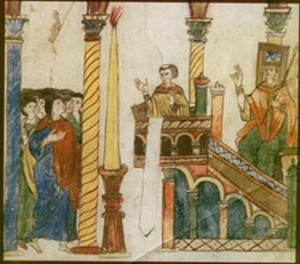Good News Travels Far
 We have become accustomed in our contemporary world to the fact that events great and small around the world are quickly reported in our news sources. A lot of what we hear is about unfortunate events, but we hear about some of the happy ones too. Coronations and elections are broadcast around the world for anyone to see. The aftermath of earthquakes, floods, wars, and shootings are also seen by millions. News travels far and fast.
We have become accustomed in our contemporary world to the fact that events great and small around the world are quickly reported in our news sources. A lot of what we hear is about unfortunate events, but we hear about some of the happy ones too. Coronations and elections are broadcast around the world for anyone to see. The aftermath of earthquakes, floods, wars, and shootings are also seen by millions. News travels far and fast.
In the months after Jesus’ resurrection and the coming of the Holy Spirit, events also moved quickly. Large numbers of people were baptized and entered the community of Followers of the Way. They weren’t yet called Christians. That came later. The community’s life was centered in Jerusalem and included people who were native to Palestine and those who came from Greece and other areas. All were living as one big community. They worshipped in the Temple, and broke bread in their homes.
As the community grew, a few people were selected as deacons to attend to the mundane details of managing such a large and diverse community. The most famous of them was probably Stephen, who was the first to die as a martyr. A fierce persecution of the community began shortly afterwards and many folks moved out of Jerusalem.
One of the deacons, Philip, went to Samaria. He told everyone he met about Jesus and the Resurrection. He performed miracles as he went through the countryside, healing many and teaching. Many people asked for baptism and joined the community of believers. When the apostles in Jerusalem heard of Philip’s work and of the conversion of the people in Samaria, Peter and John went to join him. They prayed over the new believers and asked that the Holy Spirit be poured out over them too. They laid hands on them as they prayed, and the Spirit came upon them. (Acts 8:5-8, 14-17)
In this description of the conversion of the Samaritans, we see the historic roots of the sacraments of Baptism and Confirmation. Baptism is typically the entry point into the life of the Christian community. But there was and is more to Christian initiation. The Holy Spirit comes in a special way to Christians, bringing gifts that strengthen their faith and help them bear fruit as followers and companions of Jesus. When the apostles and their successors, our bishops, lay hands on the baptized and anoint them with Chrism (the holy oil), the Spirit flows into their lives in a special and deeply powerful way. Philip, the deacon, baptized. Peter and John, the apostles, confirmed the newly baptized. All shared in the breaking of the bread, a prayer that has characterized the Christian community from the very beginning. Together these three practices, Baptism, Confirmation, and Eucharist, bring Christians into their new life and sustain their faith in their daily activities.
Jesus had promised his disciples that he would not leave them orphans when he returned to the Father. Rather, he would ask the Father to send another one, another Advocate, to remain with the community and its members forever. This Advocate would be the Spirit of truth, unrecognized by the world at large, but remaining always with believers; guiding and strengthening them in their journey of faith. (Jn 14:15-21)
It is the Spirit who continues to guide us today. The Spirit helps us live in hope, with gentleness and reverence, doing good things for others and caring for our world and those with whom we share it. The Spirit gives us strength to carry on when we face opposition or disbelief and helps us to bring about positive change in our world. In choosing the path of goodness, we live our witness to our life in Christ. (1 Pt 3:15-18) When that witness is challenged but remains faithful, powerful change is planted in soil that hungers for goodness. As time passes, the fruit of the Spirit, the holy breath of God, blossoms into the world.
Are we there yet? Has heaven come to Earth yet? No. Not yet. But is it coming? Yes. Slowly but surely, the Good News of our Lord travels into our worlds of home, work, and play.
We are still in Easter Season. Still learning with the disciples of the gifts that Jesus wants to share with us. In just a couple of weeks we will celebrate Pentecost and the coming of the Spirit. Until then, let us rejoice in the wonder of the Resurrection and the promise of Jesus not to abandon us or run off to some distant Heaven and forget us.
Jesus is alive and well and present among us. Look around and see him. See the good works that spring from his life in us. Watch as good news touches the lost and those who are forgotten in our world. Celebrate the small victories. Hope for the longer-term ones and do what you can to move forward toward them.
Good News travels far. It has come to us over many centuries and thousands of miles. May we continue to pass it forward through our lives and words.
Readings for the Sixth Sunday of Easter – Cycle A
Read More












